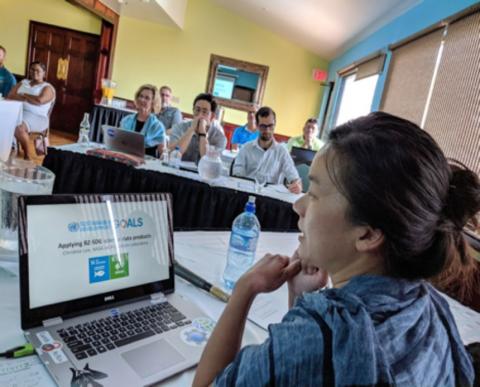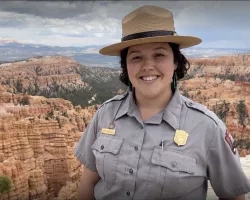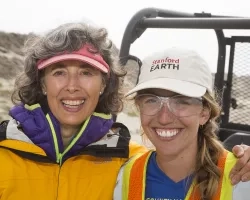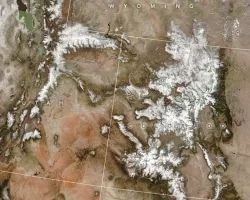Billions of people around the world are affected by water resource issues, making the everyday activities we take for granted, like taking a shower or turning on the tap and getting clean water, that much harder. NASA is committed to helping people around the world solve water resource challenges—and celebrating those in the NASA community who make that possible.
Which is why Christine Lee is one of the 2019 NASA Early Career Public Achievement Medal awardees for her work in applied sciences focusing on water quality and water resource issues. The medal is awarded for unusual and significant performance during the first 10 years of an individual's early career in support of NASA. For such an award, Lee’s already impressive body of work more than fits the bill; or should we say, fills the glass.
Lee supports the NASA Water Resources Program as an Associate Program Manager, committed to fostering and supporting a community of applied researchers and water practitioners through this program. Lee also conducts research that uses satellite and airborne data to help address water quality issues, and provides Applied Sciences leadership to Earth Science missions like ECOSTRESS and Surface Biology and Geology.
Prior to joining JPL, Lee completed a postdoctoral program in astrobiology at NASA’s Jet Propulsion Laboratory and a Ph.D. at UCLA in Civil and Environmental Engineering, focusing on water quality issues. Her opportunity to work with NASA Applied Sciences came in 2012 when she joined the team as AAAS Science and Technology Policy Fellow, allowing her to experience and see different ways in which her technical expertise, and NASA’s investments in Earth observing systems, could contribute to science and society.
Even a relatively shallow dive into Lee’s work yields discoveries with deep implications. “Did you know that water from the Sierra Nevada is conveyed through the San Francisco Bay Delta for agricultural water use in California’s Central Valley and Southern California’s drinking water?” Lee said. Currently she’s working on a project to improve quality monitoring in Californian water supplies, in collaboration with the California Department of Water Resources, Metropolitan Water District, Oregon State University, the U.S. Geological Survey, University of California, Merced, and 34 North. The goal is to operationalize the processing of different water quality parameters so that monitoring is more effective everywhere from local reservoirs to, well, the San Francisco Bay Delta.
“With the drought, multiple beneficial uses of California’s water, and the complexity and vastness of California’s water system, there was a unique opportunity to apply remote sensing data to support monitoring and management,” Lee explains.
And additional opportunities for Lee abound. She’s also on a team that is analyzing coastal water quality impacts on coral reefs in Belize for U.N. Sustainable Development Goals and she’s recently been selected to join the ECOSTRESS Science and Applications Team to focus on monitoring water temperature stress conditions of endangered fish in in the Bay Delta.
“Being at NASA JPL allows me to work with data, build partnerships and programs, and help discover new ways NASA’s data can be utilized for societal benefit. I love integrating these lessons learned as input into current and future missions.” Lee says. And how does she feel about receiving this award? “It’s a huge honor, and for me it was a total surprise. I feel very fortunate that I’m able to work in this area.”
For water-drinkers everywhere, the fortune is ours.
The awards ceremony will occur at the Jet Propulsion Laboratory in Pasadena, CA on October 29, 2019.



